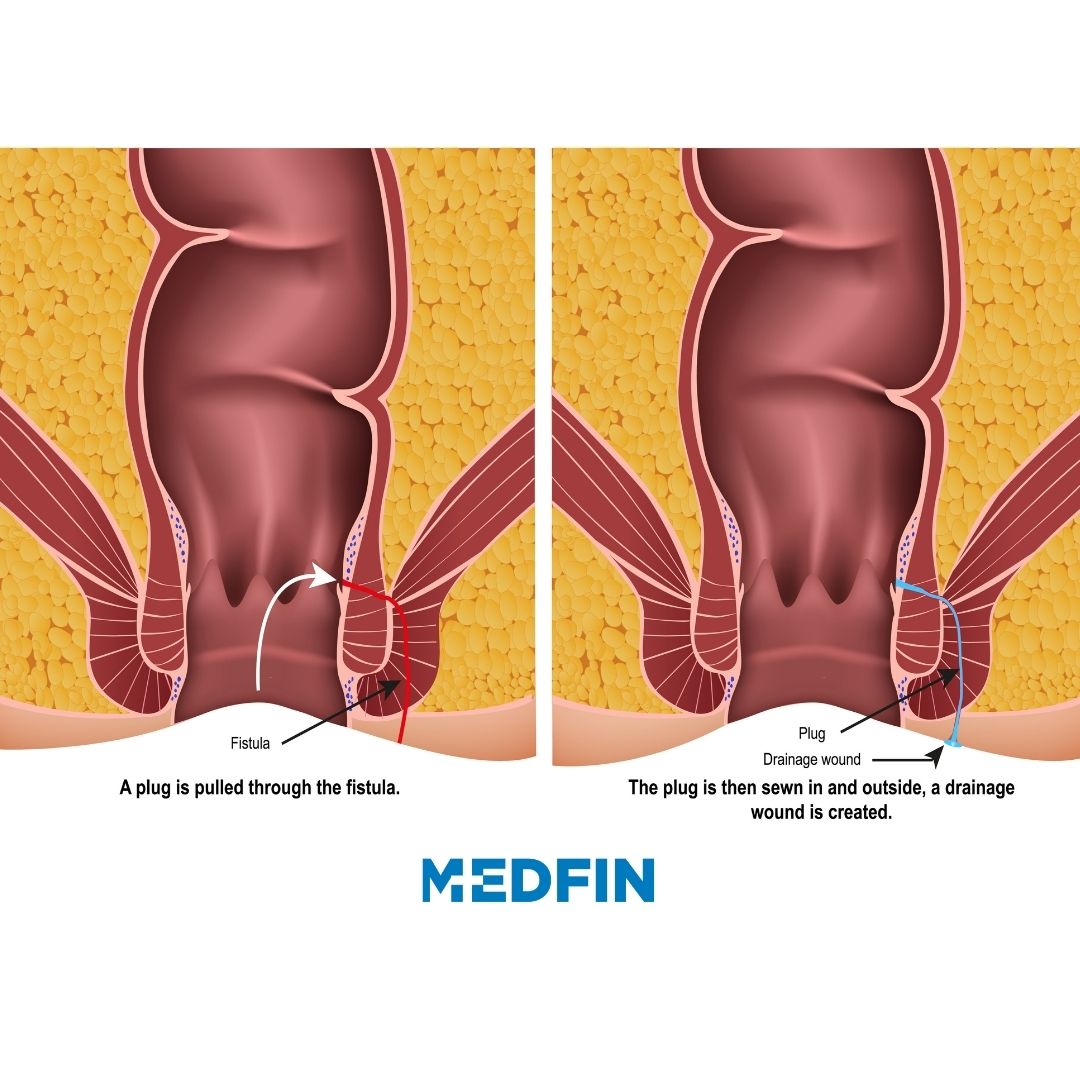Proctology
Home Remedies to Cure Fistula

by admin
28th November 2023
7 minutes read
Introduction
An anal fistula is a small tunnel that develops between the end of the bowel and the skin near the anus. Characterised by discomfort, bleeding, and other symptoms, it can pose significant health issues if left untreated. While surgical procedures often provide a viable solution, they might not be the first preference for many individuals due to factors such as potential complications, cost, and personal comfort. Thus, many are turning to home remedies and natural treatments to manage and potentially cure this condition. This article will explore a range of fistula home remedies, discuss their effectiveness, and offer insights on complementary medical treatments.
Understanding the Anal Fistula
Understanding an anal fistula is a crucial first step in managing and treating this condition effectively. An anal fistula is an abnormal tunnel or passageway that develops between the end of the bowel or rectum and the skin near the anus. It is often the result of an infection or abscess in the anal canal. Once the abscess drains, it can leave behind a small channel. This is the fistula, and it can cause continuous drainage and may lead to recurrent infections if not properly treated.
Anal fistulas are typically classified according to their location and the complexity of the tract. The most common type is the ‘intersphincteric fistula’, which crosses only the internal anal sphincter. More complex fistulas may involve other parts of the anal sphincter muscles or even the rectum.
Symptoms of Anal Fistula
An anal fistula can present a variety of symptoms that may impact a person’s daily life. These can include:
- Persistent anal pain and discomfort, which can become more intense during bowel movements or while sitting.
- Irritation of the skin around the anus, including swelling, redness, and tenderness.
- Bleeding or discharge, often a mix of blood and pus, from an opening near the anus.
- Recurrent anal abscesses, as the fistula can continuously become reinfected.
- Systemic symptoms, such as fatigue, fever, and malaise, especially when the fistula becomes infected.
Causes of Anal Fistula
The most common cause of an anal fistula is an anal abscess, which arises from an infection in the small anal glands located inside the anus. When these glands become blocked, an abscess can form, which can eventually create a fistula.
Anal fistulas can also be associated with conditions that affect the bowels, such as Crohn’s disease or diverticulitis. In rare cases, they can be caused by conditions like tuberculosis, HIV, or trauma to the area.
Understanding the nature of anal fistulas and the potential symptoms and causes are vital to ensure appropriate and effective treatment. It’s essential to seek professional medical advice if you suspect you may have this condition. While home remedies can be helpful for symptom management, professional medical intervention is often needed to heal an anal fistula effectively.
Fistula Treatment: Conventional Medical Approaches
Fistula treatment typically involves a two-pronged approach: managing the symptoms and eradicating the underlying cause. The best treatment for a fistula usually depends on its size, location, and the patient’s overall health.
The most common form of treatment is fistula surgery, known as fistulotomy, which involves cutting open the whole length of the fistula to flush out the infected tissue. After the surgery, the wound is left open to heal from the inside out. While anal fistula surgery is often effective, it can be invasive and may require a significant recovery period.
In addition to surgery, fistula medicine can be used to control symptoms and manage the condition. Anal fistula medicines often include antibiotics to control infection, pain relievers to manage discomfort, and stool softeners to make bowel movements more comfortable.
However, for those seeking alternative solutions or wish to complement their medical treatment, various home remedies have been used to manage fistula symptoms and potentially aid in healing.
Home Remedies for Fistula
Please note that while home remedies can help manage symptoms, they should not replace professional medical advice and treatment. Always consult with a healthcare provider before starting any new treatment plan.
Fiber-Rich Diet
A diet rich in fiber can help by softening stools, thus reducing pain during bowel movements. Foods like whole grains, fruits, vegetables, and legumes are high in fiber and can be easily incorporated into daily meals.
Sitz Baths
Warm sitz baths can provide relief from the pain and itching associated with anal fistulas. Soaking in warm water for 15 to 20 minutes several times a day, especially after bowel movements, can help soothe the area and keep it clean.
Aloe Vera
Aloe Vera is known for its healing and anti-inflammatory properties. Applying pure aloe vera gel topically to the affected area can help reduce inflammation and promote healing.
Turmeric
Turmeric, a potent anti-inflammatory and healing agent, can be used both topically and orally. A paste made from turmeric and water can be applied to the affected area, or turmeric can be consumed orally in the form of capsules or as a spice in meals.
Tea Tree Oil
Tea tree oil, known for its potent antimicrobial and anti-inflammatory properties, can be diluted and applied topically to help reduce infection and inflammation.
Anal Treatment: A Blend of Conventional and Natural Approaches
In many cases, the best approach may be to combine conventional medical treatments with home remedies. For instance, while undergoing fistula surgery, these natural home remedies can help manage symptoms and may potentially aid recovery.
Conclusion: Finding the Best Treatment for Fistula
It’s essential to remember that while home remedies can provide symptom relief, they are not a guaranteed cure for anal fistulas. Their effectiveness can vary from person to person, and they may not be suitable for everyone, particularly in severe cases.
Always seek advice from a healthcare provider to determine the best treatment for fistula. It is crucial to consider all options, including anal fistula surgery, fistula medicine, and home remedies. By understanding the condition and exploring all available options, individuals suffering from an anal fistula can make an informed decision that best suits their health needs and lifestyle.
How can Medfin help?
Medfin is a daycare surgery expert providing access to the latest surgical procedures and top doctors in your city at affordable prices. Medfin provides you access to top doctors and surgeons with 10+ years of experience. With Medfin, you can leave your hassles behind and focus on your health. From instant consultations to paperwork assistance, we have got you covered with everything. So why wait? Call us today!
FAQs
While surgery is the primary treatment for fistulas, there are some alternative therapies that people may consider as complementary options. These include Ayurvedic treatments, homoeopathy, and naturopathy. However, their effectiveness varies from person to person, and medical consultation is essential before opting for alternative treatments.
Stress can potentially exacerbate certain health conditions, and fistula symptoms might be affected as well. Stress-reduction techniques, such as meditation and deep breathing exercises, may be helpful in managing overall well-being.
Yes, some warning signs include severe pain, fever, pus discharge with a foul odor, increased swelling or redness around the fistula site, or any sudden worsening of symptoms. These require an immediate medical evaluation to prevent complications.
Yes, certain dietary modifications may be beneficial. Increasing fiber intake can help prevent constipation, which can aggravate fistula symptoms. Drinking plenty of water and consuming foods rich in vitamin C and zinc may also aid in the healing process.
Home remedies can help manage symptoms and promote healing, but they may not cure a fistula completely. Seeking medical advice and treatment is crucial to effectively address the condition. Home remedies can be used as complementary measures, but medical intervention is essential for a long-term solution.
CATEGORIES
- ACL Reconstruction
- Anal Fissures
- Anal Fistula
- Appendicitis
- ASK A DOCTOR
- Benign Prostatic Hyperplasia
- Breast Lump Excision
- Cataract
- Circumcision
- Conditions & Diseases
- Cosmetology
- Covid-19
- Cure
- Endocrinology
- ENGLISH VIDEOS
- Eye Care
- Gallstones
- General Surgeries
- Government Schemes
- Gynaecology
- Gynecomastia
- Health
- Health Insurance
- Hernia
- hindi
- Hip Arthoscopy
- Hip Replacement
- Hip Replacement Surgery
- Hydrocele
- Kannada
- Kidney Stones
- Knee Arthroscopic
- Laparoscopic
- LASER
- Latest Treatments
- Lifestyle
- Liposuction
- Medfin Stories
- Medicine
- Nephrology
- Ophthalmology
- Orthopaedic
- Paraphimosis
- Patient Testimonials
- PCL Reconstruction
- Phimosis
- Piles (Hemorrhoids)
- Pilonidal Sinus
- Proctology
- Prostate Artery Embolization
- Rhinoplasty
- Second Opinion
- Total Knee Replacement
- Uncategorised
- Urology
- uterine artery embolization
- Uterine Fibroids
- Varicocele
- Varicose Veins
- Vascular
- VIDEOS






